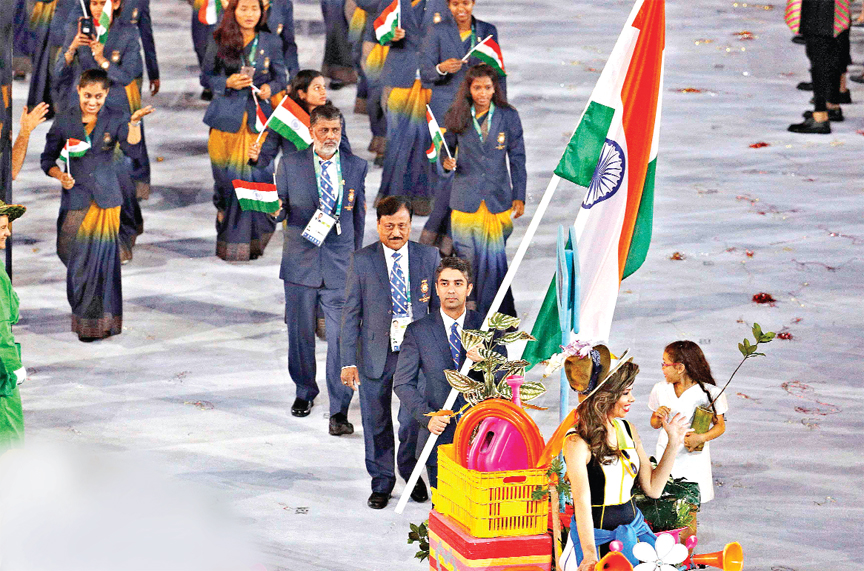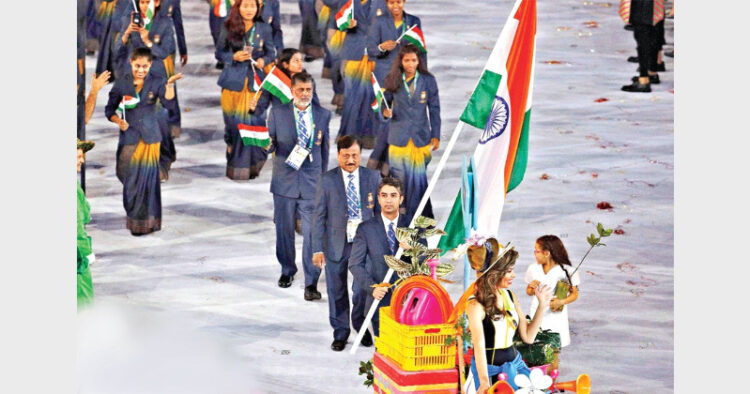 Out of 119- strong contingent at Rio Olympics 2016, India managed to get a silver and a bronze. This poor performance certainly has many more messages besides the widely accepted one, ‘Girls saved India’s pride’
Out of 119- strong contingent at Rio Olympics 2016, India managed to get a silver and a bronze. This poor performance certainly has many more messages besides the widely accepted one, ‘Girls saved India’s pride’
Dilip Chaware
Bharatiya athletes tried their best in Rio de Janeiro Olympics despite various difficulties but were unable to succeed against the superb preparedness of the players of other countries, especially of the ten most victorious countries which have claimed over 55 per cent of all the medals.
Britain’s Golden SecretGreat Britain moved from No 36 in Atlanta Olympics to No 2 in Rio “The secret of our success is the work put into training schedules, diet,
|
Bharat has won two medals only: PV Sindhu’s silver in badminton and Sakshi Malik’s bronze in women’s wrestling. Dipa Karmakar’s bronze was missed just by a whisker. Otherwise, the overall performance of Bharat’s contingent, the largest sent so far, has been disappointing. Especially afer Bharat had won six medals in the 2012 London Olympics, its best-ever performance.
Cover Story : What it takes to win a medal
The Rio Olympics has once again highlighted the neglect of our players by the authorities. Some players said in exasperation that their struggles on field were less gruesome as compared to what they faced off the Olympic arena.
Lot was expected from the Hockey team but we have not managed to reach into the semi-finals. We lacked killer instincts in the players. There is a lack of motivation. We need to focus on support staff who can work well on mental condition of players. Time has come to adopt uniform coaching structure —Anupam Ghulati, Hockey Expert and Commentator
A Land of MedalsHow can a tiny country Jamaica win so many golds? Jamaica’s global dominance in running started to emerge over half a century ago. At the 1952 Helsinki Olympics, in which Bharatiya wrestler Khashaba Jadhav won a bronze, Jamaica was ranked 13th by the International Olympic Committee. In the 2008 Beijing Olympics, Jamaica was first in sprints. The amazed world was watching a miracle called Usain Bolt, who won three gold medals. |
It is a challenge even to qualify for the Olympics. Many achieved that distinction but were almost forgotten afterwards by the officials. In terms of treatment, respect, and facilities, they were the most ignored lot. On the other hand, many official delegates flew in business class to the Olympics while the athletes themselves had to endure untold hardships. Sprinter Dutee Chand had to undertake a 36-hour flight in the economy class whereas on the same plane, the managers and delegates were travelling in business class.
Cover Story : Champions Against All Odds
Chand reached Rio exhausted and failed to qualify for the 100-meter semi-finals. Dipa Karmakar is now showered with praise but only because she entered the women’s vault finals. What she had to face before, her feat is shameful for any sports-loving country.
Dipa’s physiotherapist wasn’t allowed by the authorities to accompany her when she left for Rio but the picture changed as soon as she entered the finals. Earlier, his presence was claimed to be “wasteful” by the Sports Authority of India (SAI). The same officials swung into frenzied action as soon as she qualified for the finals and her
physiotherapist was asked to fly to Brazil at the earliest.
Nothing surprising that the Bharatiya team’s chief medical officer appointed for the Rio Olympics wasn’t a specialist in sports medicine. He was a radiologist. This fact came to light only later. The most shocking incident took place on August 15, Bharat’s Independence Day. Everybody in the Olympic arena was excited and to match the occasion, the Ministry of Youth Affairs and Sports had arranged a grand reception for the athletes. It was supposedly hosted by the Bhartiya embassy at the Olympian Reunion Centre. Many of the athletes decided to attend and had to skip dinner at the Games Village since they had to be at the Embassy on time. Expectedly, they were looking for a sumptuous Bharatiya fare. They were served cold drinks and a few peanuts. They could not lodge an official complaint since they felt it more important to uphold Bharat’s prestige than crib for dinner. So far, no regret has been expressed by Bharat’s external affairs ministry.
Now that the dust is settling down, Bharat should introspect candidly about its dismal performance and concentrate on developing a national sports culture to fare better in future. Parents and
children should be imbibed with the sentiment that nationalism is
synonymous with winning victories in sports. This can be done by investing for a better and larger sports infrastructrure at schools, especially those where a sports tradition already exists. Deshi sports, not just cricket, should be
popularised with the involvement of leaders, stars and corporates. We are a country with vast talent. A sense of
confidence needs to be instilled in our youngsters that we can perform in every world event, not just Olympics.
The experience in Britain has proved that large dose of funding is essential for sports promotion. So, let us not be coy about it. Experts feel that Bharat should take another cue from Britain and concentrate only on those games in which it has some potential. For instance, Britain has decided to reduce its attention from archery or badminton. Incidentally, Bharat has a rich tradition in both these arts. Our scriptures and mythological descriptions are full of trained wrestlers, archers and swordsmen. Swimming and cyling can be considered, too. Similarly, our Vanvasi children and youths can run so fast that they will be able to grab Olympic medals with due training and guidance. If our sportspersons can perform so well without any
institutional support, we can certianly look forward to a much better performance from them after adequate preparations.
How to achieve this?
If one reads about the importance given to sports in a tiny country like Jamaica, it will be obvious that most of Bharatiyas do not give any importance to sports. Our focus is on garnering more and more marks in academic examinations. Therefore, from very early age, our children are taught that sports is an activity for those who can’t excel in examinations. Hopefully, the picture is changing, but not rapidly enough. Moreover, there is a total lack of sports infrastructure in most schools, colleges and universities. The absence of expert coaches is another problem. These drawbacks can be overcome by improving the infrastructure, which should also pay attention to proper diet of the sportspersons.
(with inputs from Nishant Kr Azad)














Comments